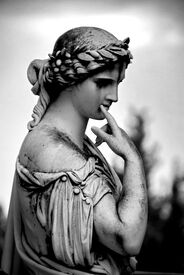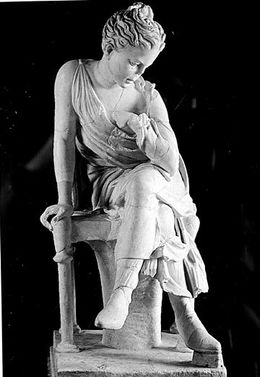The Lukeion Muse Series: Greek & Latin Literature in Translation
Classic literature is still something that hangs in the air like a song.
--Gilbert K. Chesterton

One would never ask a child to start working on algebra before he's mastered addition, subtraction, multiplication and division. That would be silly. The child may intuitively make sense of a few problems but most of the algebraic complexities would be lost on his unprepared mind. This isn't too different from asking a person to complete his education without any ideas about where he came from and what the many generations before him thought, fought, and feared. The complexities of human existence will be lost on him and he'll be stuck focused on the trivialities that have become so popular among others stranded in the same generational boat.
Classical literature is the foundation of Western civilization. It has inspired how we have thought and behaved for the past 2700 years. The current generation is among the first to forego the benefits of this essential topic, and the results? A mentally impoverished generation will soon become our future leaders, thinkers, and lawmakers. A study of Classical literature is not only a practical course but a requirement for any learner in need of a well-rounded education.
Classical literature is the foundation of Western civilization. It has inspired how we have thought and behaved for the past 2700 years. The current generation is among the first to forego the benefits of this essential topic, and the results? A mentally impoverished generation will soon become our future leaders, thinkers, and lawmakers. A study of Classical literature is not only a practical course but a requirement for any learner in need of a well-rounded education.
There are three classes of men; lovers of wisdom, lovers of honor, and lovers of gain.
--Plato
Why take the Lukeion Project Muse series?
The Lukeion Project takes a balanced interdisciplinary approach to Classical literature. No student can understand literature without also gaining an appreciation for the life and culture of the people portrayed in that literature. An interdisciplinary approach features not only a study of primary literature but also art, architecture, culture, poetry, history, and philosophy.
Our literature survey courses are college preparatory. They promote time management and encourage critical analysis in exam essays and research projects. They prompt good note taking and study skills. Good candidates for this course must be confidently reading and writing at the high school level since both courses require robust weekly reading assignments. The instructor will provide suggestions and pointers for first time research writers and note takers. For those who would like to follow our full sequence of courses, if academic time permits, we recommend that students complete the Muse Series before taking Mythology or Classical History courses (the Muse Series is not a prerequisite, however).
"'E' is totally loving his literature (Muse on the Loose) class with Dr. Fisher. We could not have asked for a better instructor or learning experience. He's really looking forward to the spring session. We're so grateful for your program and the hard work you put into creating and providing these classes." ~Lukeion Parent
Our literature survey courses are college preparatory. They promote time management and encourage critical analysis in exam essays and research projects. They prompt good note taking and study skills. Good candidates for this course must be confidently reading and writing at the high school level since both courses require robust weekly reading assignments. The instructor will provide suggestions and pointers for first time research writers and note takers. For those who would like to follow our full sequence of courses, if academic time permits, we recommend that students complete the Muse Series before taking Mythology or Classical History courses (the Muse Series is not a prerequisite, however).
"'E' is totally loving his literature (Muse on the Loose) class with Dr. Fisher. We could not have asked for a better instructor or learning experience. He's really looking forward to the spring session. We're so grateful for your program and the hard work you put into creating and providing these classes." ~Lukeion Parent
Muse on the Loose: Survey of Greek Literature in Translation

In the autumn semester we introduce the 5 major genres of Greek literature that are so foundational to Western literature. Muse students read selections in translation from poetry, history, philosophy, drama and science/mathematics. Readings span Homer to the Hellenistic writers, with special attention to the plays of Aristophanes & Euripides, the philosophy of Plato & Aristotle and the histories of Herodotus, Thucydides & Xenophon. Expect weekly readings, quizzes, a final exam, and four short writing assignments. Excellent transitional course between essay writing and research papers. Recommended for ages 15 and up.
Suggested companion course: Survey of Latin Literature: Muse Re-Loosed.
Required text:
The Norton Book of Classical Literature by Bernard MacGregor Walker Knox, 1993 (Norton).
Instructor: Sue Fisher
AUTUMN: Thu 11:30 am
Suggested companion course: Survey of Latin Literature: Muse Re-Loosed.
Required text:
The Norton Book of Classical Literature by Bernard MacGregor Walker Knox, 1993 (Norton).
Instructor: Sue Fisher
AUTUMN: Thu 11:30 am
Muse Re-Loosed: Survey of Latin Literature in Translation

In the spring semester we introduce the literature of the Romans from the earliest interpretations of Greek dramas to the writings of the Imperial Age. Through drama, poetry, history, philosophy, and satire students will follow the history and thought life of the Roman people through the eyes of its poets and statesmen. Authors include Plautus, Terence, Lucretius, Cicero, Catullus, Horace, Vergil, Ovid, Petronius, Livy and Tacitus in translation. Expect weekly readings, quizzes, a final exam, and four short writing assignments. Excellent transitional course between essay writing and research papers.
Prerequisites: Recommended for grades 9-12. Students should be reading and writing at the high school level. Suggested companion course: Survey of Latin Literature: Muse Re-Loosed. Recommended for ages 15 and up.
Required text:
The Oxford Anthology of Roman Literature , by Knox and McKeown, 2013.
Instructor: Sue Fisher
SPRING: Thu 11:30 am
Prerequisites: Recommended for grades 9-12. Students should be reading and writing at the high school level. Suggested companion course: Survey of Latin Literature: Muse Re-Loosed. Recommended for ages 15 and up.
Required text:
The Oxford Anthology of Roman Literature , by Knox and McKeown, 2013.
Instructor: Sue Fisher
SPRING: Thu 11:30 am
What to expect in the Muse Series
At the Lukeion Project, everything that is assigned to your learner can be found on a full schedule located on the last page of the course syllabus published at the start of the semester. Learners prepare for quizzes when they become familiar with the assigned readings and conversant with what is presented in class. Learners must take notes during the live session and while reading assigned passages. Depending on the student's experience in note-taking, a parent may need to help beginners develop this skill to avoid unnecessary frustration. Learners should also keep an organized notebook and recopy class notes after each session. Online review games are available on the class web page when appropriate to help prepare for tests. In addition to multiple choice and matching type questions, learners will write short response essays (2-5 paragraphs) to questions posed on quizzes. Essays ask for analysis and answers to “big picture” issues evident in the reading. Details (terms, names, places, etc.) will help learners write an effective essay response and do a good job on the rest of the quiz.
Learners will develop their analytical skills with a number of writing assignments during the semester that rely on creative application of concepts learned. This course is an excellent introduction to the fundamentals of writing and analysis that will be further developed through research in courses like Mythology in Classical Literature and Classical History. We also recommend our Composition and Research course for 10th to 12th grade-level students.
Lukeion Literature Students will:
1. Complete weekly reading assignments
2. Take quizzes and a final exam
3. Plan and complete several writing assignments
4. Attend the live session once a week, and participate by asking great questions and offering opinions and answers when asked.
Learners will develop their analytical skills with a number of writing assignments during the semester that rely on creative application of concepts learned. This course is an excellent introduction to the fundamentals of writing and analysis that will be further developed through research in courses like Mythology in Classical Literature and Classical History. We also recommend our Composition and Research course for 10th to 12th grade-level students.
Lukeion Literature Students will:
1. Complete weekly reading assignments
2. Take quizzes and a final exam
3. Plan and complete several writing assignments
4. Attend the live session once a week, and participate by asking great questions and offering opinions and answers when asked.
